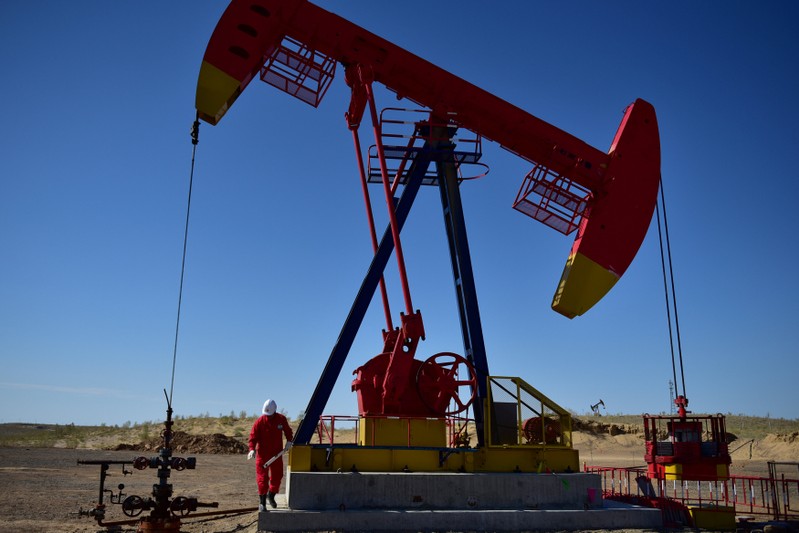
FILE PHOTO: worker inspects a pump jack at an oil field in Tacheng, Xinjiang Uighur Autonomous Region, China June 27, 2018. REUTERS/Stringer/File Photo
August 1, 2018
By Aaron Sheldrick and Henning Gloystein
TOKYO/SINGAPORE (Reuters) – Oil prices fell on Wednesday after industry data showed U.S. stockpiles of crude unexpectedly rose, and as economic growth slowed, especially in Asia, amid the escalating trade dispute between the United States and China.
Brent futures dropped 28 cents, or 0.4 percent, to $73.93 a barrel by 0634 GMT, adding to a 1.8 percent loss in the previous session.
U.S. crude futures were down 41 cents, or 0.6 percent, at $68.35 a barrel, having dropped nearly 2 percent on Tuesday.
Brent fell more than 6 percent in July, while U.S. crude futures slumped about 7 percent, the biggest monthly declines for both benchmarks since July 2016.
Weighing on prices was a report by the American Petroleum Institute (API) that showed domestic crude inventories rose by 5.6 million barrels last week. A Reuters poll had forecast a fall of 2.8 million barrels. [API/S]
Official data from the U.S. Energy Information Administration (EIA) is due later on Wednesday. [EIA/S]
“The API data this morning knocked the market lower. But it had already been under pressure after Brent failed to hold the push back up into the old one-year uptrend it broke out of in past months,” said Greg McKenna, chief market strategist at AxiTrader.
Brent may drop to as low as $71 a barrel before being supported, while U.S. crude “has a $2-$4 fall as a strong possibility over the next week or so,” he said.
Signs that a supply disruption in the Bab al-Mandeb Strait in the Red Sea could be resolved also weighed on prices.
Yemen’s Houthi group said it was ready to halt attacks in the Red Sea to support peace efforts. Saudi Arabia suspended oil shipments through the strait last week after the Houthis attacked two Saudi oil tankers.
Prices are also falling in the physical market, where top oil exporter Saudi Arabia is expected to cut prices for all crude grades going to Asia in August, according to several market participants on Wednesday.
ECONOMIC SLOWDOWN
Markets are also being pulled lower by concerns over slowing economic growth because of the trade dispute that is still ramping up between the United States and China.
Last month, China and the United States slapped tariffs on $34 billion of each other’s goods, and another round of U.S. tariffs on $16 billion in Chinese goods is expected in August.
The trade spat may escalate further as U.S. President Donald Trump’s administration is poised to propose 25 percent tariffs on a further $200 billion of imports, up from an initial proposal of 10 percent.
With the world’s two biggest economies at loggerheads, growth is slowing down.
Manufacturing across Asia slowed in July, deepening concerns about the region’s economic outlook as the U.S.-China trade conflict sent shudders through their trading partners.
This slowdown is starting to show in the container market, in which the vast majority of finished goods are imported and exported.
The Harpex container index has fallen by 10 percent from its 2011 highs in June, to a last close of 613, its lowest level since March.
(Reporting by Aaron Sheldrick and Henning Gloystein; Editing by Richard Pullin and Tom Hogue)

